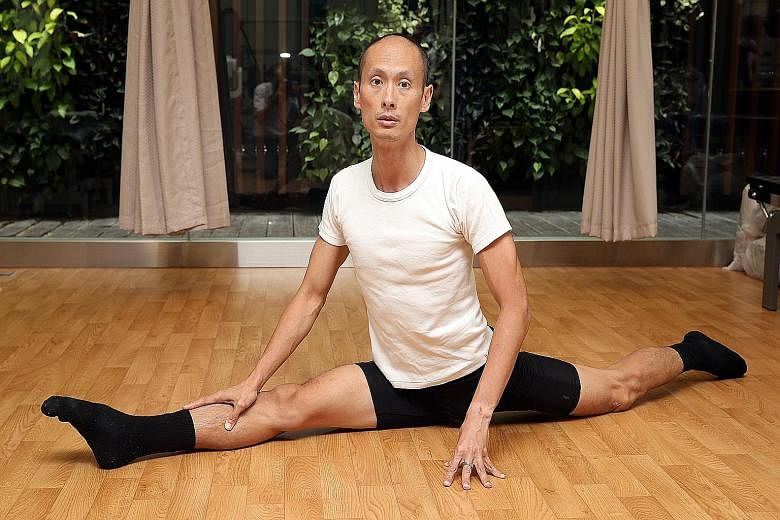Q What is your secret to looking so fit?
A I subscribe to the philosophy that form follows function. When I was training for triathlon races, I trained my body to perform better in that sport. Now, in dance, the training is aimed at changing the body to conform to the requirements in dance.
Q How did you get into dancing?
A It's almost four years since I began learning dance. It started with a dance performance that I watched. It piqued my interest and I've been researching and learning about dance ever since.
I do contemporary dance and, since the beginning of last year, I've started learning ballet.
I also dance and perform with the second company of Re: Dance Theatre. I am one of the few amateurs there and I have much to learn.

-
BioBox
-
DR JASON CHIA
Age: 43
Height: 1.68m
Weight: 56kg
Dr Jason Chia used to do triathlons before he took up dance at the age of 39.
He is a senior consultant and head of the Sports Medicine and Surgery Clinic at Tan Tock Seng Hospital.
Besides sports injury management, he is involved in fitness testing, exercise prescription, weight management, gait analysis and extracorporeal shockwave therapy (ESWT) - a technique that uses shockwaves to treat some common injuries.
He has written and published a handbook on exercise prescription for GPs. His areas of clinical research include ESWT and biomechanical research.
He has been the medical director for sports events such as the Osim triathlon, Aviva Ironman and the HSBC wakeboarding championship. He was also a sports medicine adviser during the Asian Youth Games and Youth Olympics Games.
Dr Chia is single and describes himself as being "attached" to dance.
Q What was so inspiring about that performance you watched four years ago?
A I had not paid much attention to dance prior to that performance, or to the arts in general.
But the feelings that performance evoked in me left an indelible impression till this day. I've been trying to understand the discipline since but till this day I cannot explain why certain movements should evoke certain feelings or impressions in the audience.
In the last four years, I've had the good fortune of meeting many kind and patient people willing to teach me dance, despite my late start.
Q Why is dancing good for health?
A If we practise dance with the appropriate conditioning and training, it is a great way to improve flexibility and strength. It can also gel with aerobic fitness.
Q Has there ever been a time when you were not fit and fab?
A About 13 years ago, I did an experiment when I was a student living in a hostel. I ate as much of the food that they served in the cafeteria as I could. That included ice cream, which came in huge canisters to which you can help yourself, with toppings.
I managed to reach, what is for me, a lofty 59kg. But I have never been that heavy again.
I did not exercise much before the army, but was lucky to have had a sergeant who was into triathlons. That was when exercise became a routine for me.
Q What is your diet like?
A It's kaya toast and coffee for breakfast, a Caesar salad wrap for lunch, and, usually, vegetables, rice and eggs for dinner. I don't vary my diet much. Once I find something nice and convenient, I just take it.
Q What are your indulgences?
A When it's convenient, I like to have a salted caramel ice blended coffee at Toledo's, a hipster cafe.
Q What do you do to relax?
A If I get any more time outside of work and dance, I like to read.
Q What are the three most important things in your life?
A My work, dancing, and marrying what I have been fortunate to learn in medicine as well as dance. I like my work as a doctor and I especially like helping other dancers overcome their dance injuries and better understand their bodies.
Q What's your favourite part of your body? And the least favourite?
A I don't have a particular favourite part. I think the amazing feature about the human body is how it seems to be infinitely adaptable and, with proper training, it can do vastly different things.
Q What are your must-dos before and after a training session?
A I must stretch before and after my dance routines. It reduces the creakiness in my body when I crawl out of bed the next morning.
Q How important is it for you to keep up with your fitness routine?
A Very important. It's an aspect of taking care of and training your body so that it can be a better tool. One of my dance teachers used to say that training your body in dance is like tuning a musical instrument.
Q How extensive is your collection of sports-related paraphernalia at home? Among them, what is your most-prized possession?
A I used to own three bikes and an assortment of gadgets for running during my triathlon days. Nowadays, it's just a pair of worn-out socks , one pair of ballet shoes and a big gym bag.


